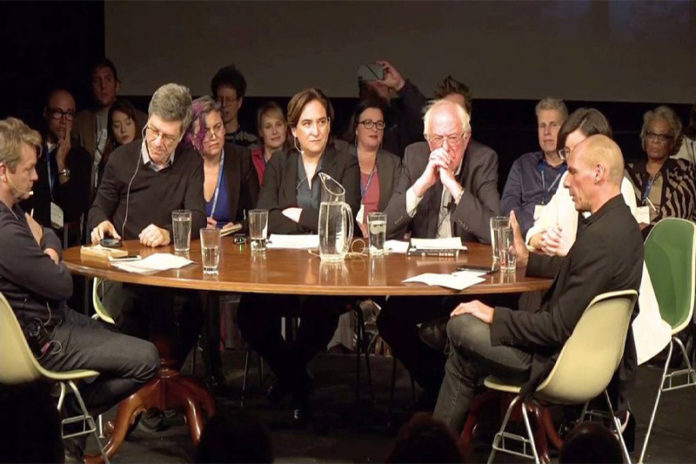
American Democrat Bernie Sanders and former Greek minister Yanis Varoufakis promote a progressive international
Shani MARS
“There is an ongoing global war against workers, against the environment, against democracy, against decency. A network of right-wing factions is spreading across borders to erode human rights, silence disagreements and promote intolerance. Since 1930 mankind did not face such a threat. ” With such direct words begins the manifesto of the Progressive International, a platform promoted by veteran leftist senator Bernie Sanders and the celebrated Greek economist Yanis Varoufakis as response to old and new enemies . The old are the elites that they accuse of creating an increasingly unequal economic system; The new are the conservative cutting populist movements with which no one counted a few years ago.
Donald Trump’s electoral victories in the United States, by Jair Bolsonaro in Brazil and the Italian Deputy Prime Minister Matteo Salvini served as a life certificate of this tendency, an empirical proof, almost a postal address. The Progressive international is looking for yours in some way. It proposes a “global network” of the left that hits the tide that comes from the right. When politicians and intellectuals met between November 29th and 1st. Of December at the headquarters of the Sanders Institute in Burlington (Vermont), to present the initiative, came to very similar diagnoses.
They attended the meeting of Vermont personalities such as economist Jeffrey Sachs and the mayor of New York, Bill de Blasio, passing by actress Cynthia Nixon (of Sex and the City), a candidate for the state Government of New York, among others. A reasonable question about this initiative is the shared characteristics of right-wing populist movements in Brazil and the United States, for example, and whether the post-war social-democrat tradition in Europe can be equalled to Liberal Movement of the USA (Liberal in the North American sense of expression, i.e., progressive). In short, if the ideas of a progressive international can work on both sides of the Atlantic. The broth of culture that favored this movement, to begin with, is the same. and Sanders ‘ programs and the new DiEM25 party of Varoufakis – elaborated independently before this alliance – keep many similarities. The American is heir to the New Deal and the Great Society; The Greek comes from the culture of the state of welfare built in modern Europe.
For James K. Galbraith – Son of John K. Galbraith and member of this sphere of North American progressive economists including the aforementioned Sachs –, the new Deal represents the best historical parallelism with the new Progressive international, because it was ” A complete and very imaginative program of public action in order to overcome a great crisis and serve as an alternative to fascism, which was the great alternative, then and now. ”
But the New Deal (“New Deal” in literal translation) of the 1930 decade consisted of an interventional economic program launched by President Franklin D. Roosevelt to overcome the Great Depression, the gigantic economic crisis that liquidated 27% of the product U.S. gross domestic between 1929 and 1933 and made unemployment soar from 3% to 25% in the country. The launch of the Progressive International takes place at a time when the U.S. has its lowest unemployment rate since the Vietnam War and crosses the second longest period of economic expansion in its history, only surpassed by the 120 consecutive months of Growth in the years 90. Why then a New Deal now?
After the crash of 1929 and World War II, with the impetus of Keynesian policies (inspired by economist John M. Keynes, who defended public and monetary policies of stimulus in times of crisis), there were three decades of enormous economic splendor in USA, which made families convinced of something: that a young man could leave school and find a good job at the factory in his city, and with his salary buy a house, drive a Ford and raise his children. Today, 10 years after the outbreak of the last financial crash and the beginning of the Great Recession, the working class remains dominated by uncertainty, although the large macroeconomic indicators are recovered.
If the Great Depression has shown that the economy does not correct itself, the Great Recession has put an end to the idea of spontaneous redistribution of wealth, this so-called trickle-down (drip) of growth. In this Revolte sea they launched to fish conservative populist leaders in the Americas and Europe. And in this context we explain the proposals of a new New deal, actually a Green new deal, as it specifies the manifesto of the Progressive International, because it gives broad emphasis to environmental policies.
The real populism, defends the economist Dani Rodrik, has more to do with Roosevelt than with Trump. In an article published in February in the New York Times, this Harvard teacher recalls that populism (a term that in the US does not have the same pejorative connotations that in Brazil) began to germinate in the late nineteenth century, in the heat of the movements of workers and Small farmers, and, like today, was a response to the wave of globalization that was living at that time and that also caused collateral damage. It culminated in Roosevelt’s New Deal. “The historical lesson consists not only in which globalization and social rejection are intimately linked”, says Rodrik, “but rather that this kind of populism poorly engendered by globalization may require a kind of good populism to scare him away.”
Galbraith believes that platforms such as Sanders and Varoufakis drink so much of this populist tradition of 100 years ago as of the early twentieth century Progressism, which propugnated greater regulation and public control of rampant capitalism. “Its goal is to contain the international nationalist that is gaining space in Europe and the USA, which threatens to repress social movements and unleash uncontrolled capitalism,” he points out.
The triumph of the Trumpism in the USA occurred in parallel to the growth of candidates anchored to the left in the Democratic Party. Politicians who have no problem defining themselves as socialists in a country that usually associate this term with the former Soviet Union. John Samples, of the conservative think tank Cato, in Washington, minimizes this trend. “People still don’t want to pay more taxes, they believe that the rich should pay more, but most of the population thinks that their taxes are fine,” he stresses. “The stranger who speaks so much in New Deal is that the Democratic Party in the Thirties did not see it as a socialist experiment, but rather as an attempt to avoid socialism and fascism.” In the end, the New Deal revitalized the market economy. According to Rodrik, “he saved capitalism from himself.”














